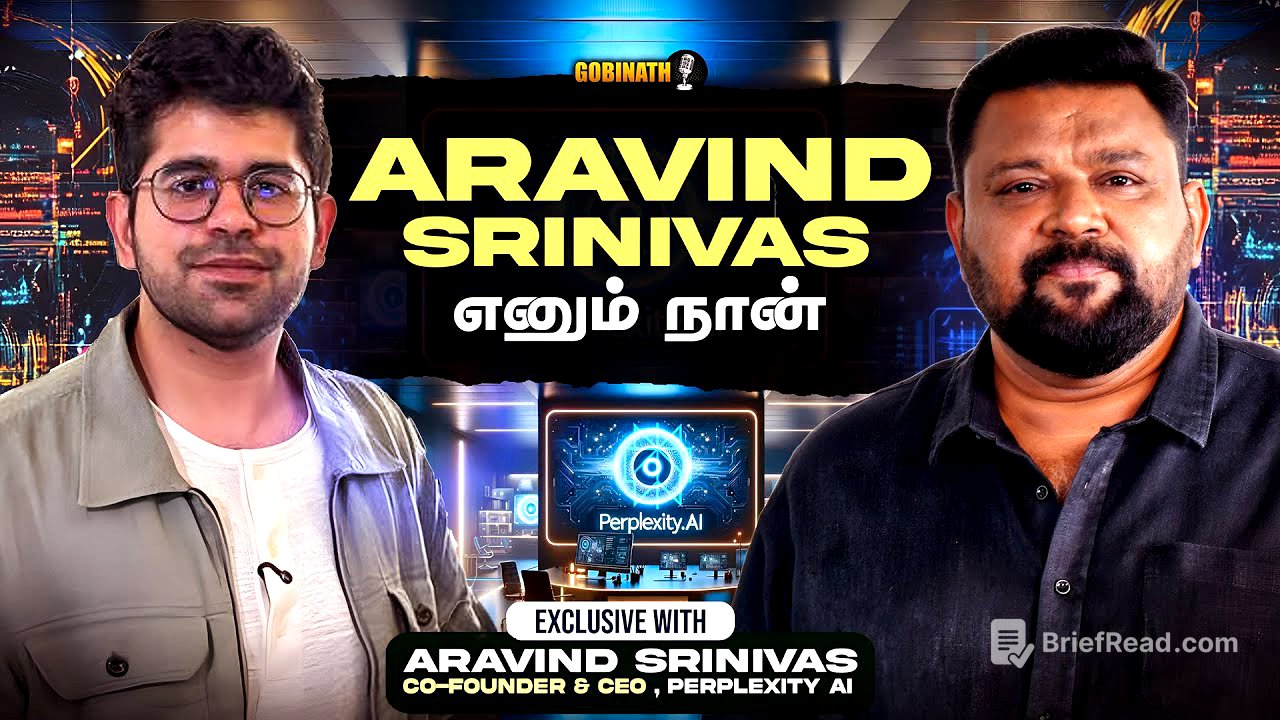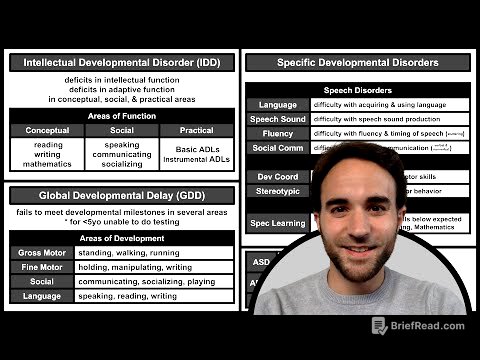TLDR;
This interview with Aravind Srinivas, CEO and co-founder of Perplexity AI, explores the company's mission to revolutionize knowledge discovery through AI-powered search. Srinivas discusses the importance of curiosity and asking questions in the age of AI, Perplexity's unique approach to accuracy and real-time information, and its strategy to compete with Google by prioritizing user trust over ad revenue. He also shares insights on AI's impact on education, the need for a venture mindset in India, and his vision for democratizing knowledge and empowering individuals through AI agents.
- The future belongs to those who ask better questions, not just those who know the answers.
- Perplexity AI aims to be a knowledge guide, prioritizing accuracy and real-time information over ad-driven results.
- Curiosity is the key human skill that AI cannot replicate, making it essential for success in the age of AI.
Episode Highlights [0:00]
Aravind Srinivas, CEO and co-founder of Perplexity AI, is interviewed about Perplexity's mission as an answer engine, its differences from Google and ChatGPT, and its aim to challenge Google's monopoly. Srinivas expresses his admiration for competition and discusses Perplexity's attempt to acquire Chrome from Google. He also shares his favorite Indian actor (Rajnikanth), cricketer (Sachin), and entrepreneur (Mukesh Ambani), and recounts a quote from Ambani: "Content is king, but distribution is God." Srinivas touches on his meeting with Indian Prime Minister Narendra Modi and emphasizes the importance of curiosity as a uniquely human skill that AI cannot replicate.
Sponsors [2:25]
The episode's sponsors are acknowledged, including Appasamy Real Estates, Dr. Shree Varma's Wellness, NexCura (powered by Gen AI Healthcare), Vishar Gurukulam, Pisupisupilladha Sunland, and Dhaanish Ahmed College of Engineering.
Introduction [3:17]
The interviewer expresses excitement about interviewing Aravind Srinivas, CEO and co-founder of Perplexity AI, due to high demand from his audience. He notes that Srinivas has made time in his busy schedule for the interview, which is taking place in San Francisco at Perplexity AI's office.
The Future Belongs to Better Questions [4:03]
Aravind Srinivas discusses the shift from valuing answers to valuing questions in an era where AI can answer almost anything accurately. He argues that the education system should incentivize asking good questions rather than simply knowing answers. Srinivas points out that students who ask questions in class are often discouraged, but this should change to foster curiosity and deeper understanding.
Education Is Changing [5:17]
Srinivas argues that the traditional lecture-based education system needs to evolve, similar to how transportation and communication have changed over time. He highlights an experiment at MIT where a biology class was taught using Perplexity AI, with students rewarded for asking insightful questions and completing assignments through deep research on the platform. This experiment demonstrated the potential for a new educational model that prioritizes inquiry and exploration.
Understanding vs Memorizing [7:58]
Srinivas emphasizes the importance of understanding over memorizing, quoting Richard Heinemann's idea that true understanding requires the ability to create. He explains that simply knowing the name of something is different from truly knowing its origins, context, and essence, which can only be achieved through questioning and deeper exploration.
Perplexity’s Mission [9:08]
Srinivas shares that Perplexity's mission statement, "where knowledge begins," is inspired by Geetha Iyengar's quote, "knowledge has a beginning but no end." He explains that Perplexity aims to facilitate continuous learning through questions, allowing users to explore topics in a natural and unbounded way.
Curiosity Drives Innovation [9:45]
Srinivas recounts a conversation with PM Modi, who emphasized that children learn by asking questions. He highlights that simple questions often lead to deep answers and that great discoveries in science and technology come from questioning existing knowledge. Srinivas uses the examples of Einstein questioning Newton's physics and the development of quantum physics to illustrate the importance of challenging assumptions and seeking truth. He argues that the education system should incentivize questioning rather than rote memorization, especially with the help of AI.
You + AI = A New Entity [12:25]
Srinivas suggests that humans and AI together form a new entity, where curiosity and creativity are the limiting factors. He emphasizes that curiosity is a uniquely human skill that AI cannot replicate.
New Generation, New Intelligence [15:39]
Srinivas addresses concerns that AI may be making the younger generation less intelligent, arguing that intelligence is evolving. He distinguishes between crystallized intelligence (remembering facts) and fluid intelligence (quickly adapting to new information). Srinivas suggests that the next generation should focus on developing fluid intelligence, as AI can handle many tasks that previously required crystallized intelligence.
Crystallized vs Fluid Intelligence [18:16]
Srinivas elaborates on the difference between crystallized and fluid intelligence, noting that the education system has traditionally incentivized crystallized intelligence. He argues that fluid intelligence, the ability to quickly learn and reason in unfamiliar situations, is more important in the age of AI.
New Learning Model [19:55]
Srinivas proposes a new learning model where students teach the class and are graded based on how well other students understand the material.
Conversation With PM Modi [20:21]
Srinivas recounts his meeting with Prime Minister Narendra Modi, highlighting Modi's emphasis on voice-based AI in local languages and the importance of referencing sources. Modi expressed concern that AI could lead to laziness and encouraged Srinivas to promote curiosity and new projects to avoid reliance on rote tasks.
AI Is Inevitable [23:37]
Srinivas argues that instead of fighting the inevitable use of AI for tasks like cutting and pasting, people should focus on new projects and value creation that AI can assist with. He emphasizes the need to upskill and challenge individuals to make their work more exciting and engaging.
AI Expands Curiosity [25:13]
Srinivas counters the idea that AI will stagnate curiosity, arguing that it actually expands it by providing instant answers and suggesting new questions. He explains that Perplexity is designed to help users ask more questions and that the company has a team dedicated to improving the suggestions for follow-up questions.
Freedom to Ask Anything with AI [27:20]
Srinivas shares his personal experience of using Perplexity to learn new subjects efficiently by asking questions and consuming content in a non-linear way. He emphasizes the freedom to ask simple questions without judgment, which is particularly valuable for those who may feel ashamed to ask basic questions in traditional learning environments.
Best MBA? Build a Company [30:06]
Srinivas, a technologist and scientist, shares his perspective on business education, suggesting that starting and running a company is the best MBA. He recounts being advised against starting a company but views it as a valuable learning experience.
Intrinsic Motivation in Building Products [31:24]
Srinivas attributes Perplexity's success to luck and intrinsic motivation to build a great product. He emphasizes the importance of building products that the team can use and that address limitations in existing tools like Google and Wikipedia.
Questions That Built Perplexity [34:36]
Srinivas reveals that the initial question that led to the creation of Perplexity was how to search over social graphs. He also shares a story about needing to find health insurance for his first employee, which highlighted the limitations of existing search engines and inspired him to build a better solution.
Perplexity Explained [36:45]
Srinivas describes Perplexity as a marriage of Google and ChatGPT, combining the search capabilities of Google with the conversational interface of ChatGPT. He emphasizes Perplexity's focus on providing accurate answers with citations, similar to Wikipedia's footnote system.
Real-Time Accuracy Matters [37:56]
Srinivas highlights real-time knowledge, accuracy, and sources as key advantages of Perplexity. He explains that AI models have a cut-off date and that Perplexity's ability to provide real-time information and cite sources is crucial in a world where AI-generated content can be difficult to distinguish from reality.
Fighting Hallucinations [39:53]
Srinivas discusses the issue of "hallucination" in AI, where AI makes up its own information. He explains that Perplexity is designed to fight hallucination by pulling information from authoritative sources, while other chatbots sometimes encourage it for creative purposes.
Perplexity as a Knowledge Guide [41:19]
Srinivas defines Perplexity as a knowledge guide, emphasizing its commitment to accuracy and integrity. He explains that Perplexity aims to be friendly but will always prioritize providing correct information over pleasing the user with incorrect answers.
Perplexity vs Google [42:29]
Srinivas differentiates Perplexity from Google by highlighting Google's incentive to prioritize ad revenue over providing the best answers for commercial queries. He explains that Perplexity is not influenced by ads and aims to provide the most relevant answer based on the user's needs. Srinivas also points out that Google's business model, which relies on link clicks and ad revenue, creates a misalignment between providing accurate answers and maximizing profit.
“Your Margin Is My Opportunity” Strategy [48:35]
Srinivas discusses the business strategy of "your margin is my opportunity," explaining that Perplexity can compete with Google by charging lower margins and focusing on accuracy, which Google cannot easily replicate due to its reliance on high-margin ad revenue.
Breaking Google’s Search Monopoly [52:54]
Srinivas states that Perplexity is trying to break Google's search monopoly. He predicts that AI queries will increase significantly in the future, and Google will not be able to maintain its 90% market share due to the emergence of new players and business models.
Who Leads the AI Race? [54:02]
Srinivas identifies ChatGPT as the current leader in the AI race due to its first-mover advantage and brand recognition. However, he notes that Perplexity is growing and that different AI models are suited for different use cases, with Perplexity focusing on accuracy, search, and knowledge discovery.
Accuracy and Trust as the Goal [55:10]
Srinivas reiterates that Perplexity's core intention is to support research, knowledge, and discovery. He believes this is a large market and aims to build AI agents that can use the internet effectively.
Comet Vision [56:19]
Srinivas introduces Comet, Perplexity's browser, which is designed to have agent capabilities. He explains that Comet will allow users to delegate tasks to AI agents, such as searching for books and placing orders. Srinivas envisions a future where everyone has a personal AI agent that can handle various tasks, making life easier and freeing up time.
Satya Nadella: A Learning Machine [1:03:59]
Srinivas discusses his mentor, Satya Nadella, CEO of Microsoft, whom he admires for his continuous learning and technical expertise. He notes that Nadella maintains a "day zero mentality" and is always eager to learn and exchange ideas.
“Content Is King, Distribution Is God” [1:05:32]
Srinivas shares a quote from Mukesh Ambani: "Content is king, but distribution is God." He explains that while having a great product is important, effective distribution is crucial for reaching users and controlling the market.
Talks with Vijay Shekhar Sharma & Sridhar Vembu [1:06:45]
Srinivas mentions that he is in touch with various Indian entrepreneurs, including Vijay Shekhar Sharma (Paytm CEO) and Sridhar Vembu, who have been supportive of Perplexity.
Jio-Style Distribution Strategy [1:07:23]
Srinivas discusses Perplexity's partnership with Airtel, which provides free access to Perplexity Pro for 38 crore houses. He explains that this strategy is inspired by Jio's approach of giving away technology for free to gain market share. The goal is to habituate users to asking questions and then introduce India-specific pricing models.
Focus and Decision-Making [1:11:57]
Srinivas emphasizes the importance of focus and decisive decision-making for a CEO. He explains that a CEO must be able to identify the most important task and execute it effectively, even if it means ignoring other sub-optimal aspects. Srinivas also highlights the need to have the courage to make incorrect decisions and correct the course quickly.
Phil’s Coffee and MIT Story [1:15:16]
Srinivas recounts his early struggles at MIT, where he lacked lab space and a dedicated advisor. He spent countless hours working at Phil's Cafe, which eventually led to top grades, a published paper, and a place in the lab. This success led to an internship offer at OpenAI.
First Internship at OpenAI & Early Struggles [1:17:01]
Srinivas shares his experiences as an international student in America, including difficulties with finances and building a credit history. He recounts how he managed to overcome these challenges and eventually afford his first iPhone.
Family, Risk-Taking, Following Your Heart [1:19:23]
Srinivas discusses his family's background in finance and their initial concerns about his decision to start a company. He emphasizes the importance of taking risks and following one's heart, even if it means deviating from a more traditional path.
India Needs a Venture Mindset [1:21:51]
Srinivas argues that India needs to cultivate a venture mindset, encouraging entrepreneurship and value creation rather than just seeking jobs in established companies. He believes that Indians have a natural strength in managing limited resources and should leverage this to create new global products.
Why India Needs Foundation Model Funding [1:23:43]
Srinivas points out that foundation models are largely coming from China and the US, and India needs to invest in its own foundation models to leverage its power and strength. He emphasizes the need for significant investment in compute, energy, data centers, chips, and research talent.
Why Perplexity Tried Buying Chrome [1:25:13]
Srinivas explains that Perplexity's attempt to buy Chrome from Google was an opportunistic effort to encourage more competition. He notes that Google argued it should not be forced to divest Chrome because there was no credible non-monopoly buyer. Perplexity aimed to demonstrate that it could be a neutral buyer and run Chrome in a way that promotes competition.
Open Source & NVIDIA Partnership [1:28:24]
Srinivas discusses Perplexity's use of open-source technologies like Chromium and its contributions to the Chromium project. He also highlights the investments from top players like NVIDIA and Databricks, attributing them to the fact that these CEOs are users of Perplexity themselves.
Why Top Tech Leaders Support Perplexity [1:29:49]
Srinivas suggests that the support from top tech leaders stems from their personal use and appreciation of Perplexity's product.
Building a New Search Index [1:30:42]
Srinivas reveals that Perplexity is building its own search index and has launched its own search API. This allows Perplexity to avoid relying heavily on the Google search index.
Personal Side [1:31:29]
Srinivas shares his favorite cricketer (Sachin), actor (Rajinikanth), and spots in Chennai (his home, Marina Beach, and IIT campus).
Democratizing Knowledge [1:32:35]
Srinivas states that his ultimate aim is to democratize knowledge and create a company that provides everyone with access to a better life.
Advice for Students & Engineers [1:33:02]
Srinivas advises students to stay hungry and curious and to adapt quickly to the changing world.
“Chasing Is Worth It” — Closing Thought [1:33:36]
Srinivas concludes by saying that "chasing is worth it."
Sponsor Break [1:34:05]
Sponsors are acknowledged again.
Credits [1:34:56]
Credits are shown.









